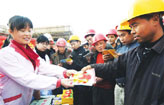Asia
Highly radioactive water moved to storage facility
Updated: 2011-04-19 10:26
(Xinhua)
| ||||
TOKYO - Operator of the Fukushima No.1 nuclear power plant, devastated by the March 11 quake and tsunami, began Tuesday to move the highly radioactive water to a storage facility, according to media reports.
The removal work started at around 10 am local time, when workers moved the highly-contaminated water at the basement of the No 2 reactor turbine building to a nearby storage facility, Jiji news agency said.
Workers connected the No 2 turbine building to the storage facility with a hose of about 800 meters and planned to pump 480 tons of water out a day.
Tokyo Electric Power Co. (TEPCO) said it is planning to move 10, 000 tons out of the 25,000 tons of the highly radioactive water in the basement within 26 days, the report said.
Radioactive water was found in the basements of the No 1 to No 3 reactors' turbine buildings, and the nearby trenches connected to them. The water totaled about 67,500 tons.
The No. 2 reactor is the most urgent one as the radioactive water is flooding its turbine building and an adjacent underground trench.
The water level in the trench is rising day by day and went up 3 cm from Sunday to 82 cm as of 7 am Monday.
The utility is also considering pouring adhesive concrete into the suppression chamber of reactor 2 to patch the hole that is believed to be causing radioactive water to leak into the turbine building and the trench.
Removing the water to nearby tanks and other storage places is considered vital to the attempt of restoring the key cooling functions at the reactors, which have been out of action since the mega-quake and tsunami.
E-paper

Han me downs
Traditional 3,000-year-old clothes are making a comeback.
Reaching out
Fast growth fuels rise in super rich
Chinese tourists spend more
Specials

Big spenders
More mainland tourists are expected to spend money on overseas travel this year.

Rise in super rich
Report cites rising property prices, gdp as key drivers of increasing number of chinese millionaires.

Reaching out
Condom makers are stepping up their presence in smaller cities to boost sales


